-
 Bitcoin
Bitcoin $107,814.2183
1.08% -
 Ethereum
Ethereum $2,463.5660
1.32% -
 Tether USDt
Tether USDt $1.0006
0.02% -
 XRP
XRP $2.1904
0.02% -
 BNB
BNB $658.4950
1.31% -
 Solana
Solana $150.0570
1.53% -
 USDC
USDC $1.0002
0.01% -
 TRON
TRON $0.2823
1.22% -
 Dogecoin
Dogecoin $0.1634
2.68% -
 Cardano
Cardano $0.5657
3.30% -
 Hyperliquid
Hyperliquid $38.6646
-0.70% -
 Bitcoin Cash
Bitcoin Cash $501.8244
-2.85% -
 Sui
Sui $2.7979
3.64% -
 Chainlink
Chainlink $13.1942
1.21% -
 UNUS SED LEO
UNUS SED LEO $8.9470
0.44% -
 Avalanche
Avalanche $17.7386
2.23% -
 Stellar
Stellar $0.2324
-0.87% -
 Toncoin
Toncoin $2.8435
1.38% -
 Shiba Inu
Shiba Inu $0.0...01148
2.34% -
 Litecoin
Litecoin $85.6186
0.37% -
 Hedera
Hedera $0.1490
1.37% -
 Monero
Monero $322.8553
1.63% -
 Polkadot
Polkadot $3.3791
1.39% -
 Dai
Dai $1.0002
0.02% -
 Bitget Token
Bitget Token $4.5749
0.75% -
 Ethena USDe
Ethena USDe $1.0002
0.00% -
 Uniswap
Uniswap $7.1451
2.66% -
 Aave
Aave $268.4133
1.40% -
 Pepe
Pepe $0.0...09614
1.94% -
 Pi
Pi $0.4952
0.74%
Does using a hardware wallet improve the security of the Ethereum wallet?
Hardware wallets drastically enhance Ethereum security by storing private keys offline, protecting against malware and phishing. While not foolproof, reputable hardware wallets, used correctly, offer significantly improved protection against various threats.
Mar 15, 2025 at 07:35 am
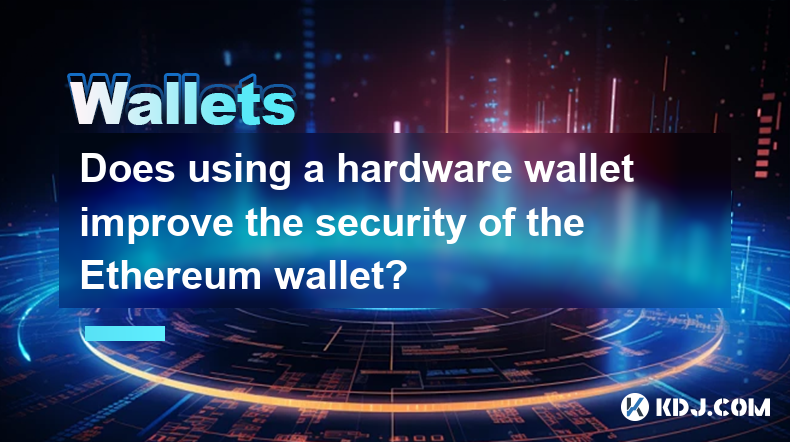
Key Points:
- Hardware wallets offer significantly enhanced security compared to software wallets for Ethereum.
- The primary advantage lies in keeping your private keys offline, protected from malware and phishing attacks.
- While hardware wallets aren't foolproof, they represent a substantial improvement in mitigating various security risks.
- Choosing a reputable hardware wallet manufacturer is crucial for ensuring genuine security benefits.
- Understanding the specific security features of your chosen hardware wallet is essential for maximizing its protective capabilities.
Does using a hardware wallet improve the security of the Ethereum wallet?
Yes, using a hardware wallet significantly improves the security of your Ethereum wallet. The core reason for this enhanced security is the isolation of your private keys. Unlike software wallets, which store your keys on a connected device vulnerable to malware and hacking attempts, hardware wallets keep your private keys securely stored within a tamper-resistant physical device. This offline storage is the critical difference.
This offline nature protects against various threats. Malware, for example, cannot access your keys if they reside on a device that's not connected to the internet. Phishing attacks, which try to trick you into revealing your private keys, are also less effective as your keys never leave the physical security of the hardware wallet.
The security of a hardware wallet is further bolstered by its secure element. This is a specialized chip designed to protect cryptographic keys and sensitive data. These chips are built to withstand various physical and software attacks, making them much more resistant to compromise than software-based solutions. This level of protection is especially crucial for securing significant amounts of Ethereum.
However, it's crucial to understand that no security system is completely impenetrable. Even hardware wallets can be vulnerable if mishandled. Physical theft, for instance, remains a risk. Therefore, securing your hardware wallet itself is paramount. Keep it in a safe place, and consider using a strong password or PIN to further protect it.
The selection of your hardware wallet is also vital. Opting for a reputable manufacturer with a proven track record of security is essential. Research thoroughly and read reviews before making your purchase. Don't be tempted by cheaper, lesser-known brands that might compromise on security features.
Beyond the choice of hardware, understanding its functionality is equally important. Familiarize yourself with the device's features, including its screen display, button controls, and any security settings. Understanding how to use the wallet correctly will help you avoid common security pitfalls.
Many hardware wallets offer additional security features beyond offline key storage. Some incorporate PIN codes, recovery phrases, and even advanced authentication methods like biometric scans. These layers of protection work together to provide a robust security system. Take the time to explore these features and understand how they contribute to your overall security.
The initial setup of your hardware wallet is critical. Follow the manufacturer's instructions carefully. This typically involves generating a seed phrase, a crucial set of words that acts as a backup for your keys. Protect this phrase with the utmost care; it's your only way to recover your Ethereum if your hardware wallet is lost or damaged. Never share this phrase with anyone.
Regular firmware updates are also crucial for maintaining your hardware wallet's security. Manufacturers regularly release updates to patch vulnerabilities and improve security. Make sure to check for and install updates promptly. This proactive approach helps ensure your wallet remains protected against emerging threats.
The cost of a hardware wallet should be viewed as an investment in security. While they are more expensive than software wallets, the enhanced protection they offer often outweighs the initial cost, particularly for users holding significant amounts of Ethereum or other valuable cryptocurrencies. The peace of mind offered by knowing your funds are significantly safer is a valuable asset.
While hardware wallets significantly improve security, it's important to remain vigilant. Always be wary of suspicious links or emails that might attempt to phish your information. Educate yourself on common scams and best practices to further minimize risks.
Frequently Asked Questions:
Q: Are hardware wallets completely secure?
A: No, while significantly more secure than software wallets, hardware wallets aren't completely invulnerable. Physical theft and sophisticated attacks remain potential threats.
Q: What happens if I lose my hardware wallet?
A: If you've properly backed up your seed phrase, you can recover your Ethereum by using that phrase to restore your wallet on a new device. Without the seed phrase, your funds are likely lost.
Q: Can I use a hardware wallet for other cryptocurrencies besides Ethereum?
A: Many hardware wallets support multiple cryptocurrencies, including Ethereum. Check the specific wallet's specifications to see which coins it supports.
Q: How do I choose a reputable hardware wallet manufacturer?
A: Research different manufacturers, read reviews, and look for wallets with a strong security track record, robust features, and positive user feedback. Look for established brands with a proven history.
Q: Is it necessary to use a hardware wallet for small amounts of Ethereum?
A: While not strictly necessary for small amounts, the added security offered by a hardware wallet is always beneficial, especially if you plan on holding your Ethereum for an extended period.
Q: Are there any disadvantages to using a hardware wallet?
A: Yes, the primary disadvantage is the cost. They are generally more expensive than software wallets and may have a steeper learning curve for some users. Also, they are less convenient for frequent transactions compared to software wallets.
Disclaimer:info@kdj.com
The information provided is not trading advice. kdj.com does not assume any responsibility for any investments made based on the information provided in this article. Cryptocurrencies are highly volatile and it is highly recommended that you invest with caution after thorough research!
If you believe that the content used on this website infringes your copyright, please contact us immediately (info@kdj.com) and we will delete it promptly.
- Robert Kiyosaki Still Bullish on Bitcoin: Why $107K is 'Cheap'
- 2025-07-02 20:30:12
- Coinbase, Liquifi, and Crypto M&A: What's the Deal?
- 2025-07-02 21:10:12
- XRP, SEC, and ETF Buzz: What's the Deal?
- 2025-07-02 22:10:11
- Nexo Drives into Crypto-Golf: A Digital Wealth Play on the DP World Tour
- 2025-07-02 21:10:12
- Crypto Down in July 2025? Decoding the Market's Mixed Signals
- 2025-07-02 21:30:12
- Arbitrum, DeFi, and TradFi: A New York Minute on the Future of Finance
- 2025-07-02 22:10:11
Related knowledge

What is "rent" on Solana and how does it affect my Phantom wallet?
Jul 02,2025 at 08:35pm
Understanding 'Rent' on SolanaIn the context of Solana, the term 'rent' refers to a storage fee that users pay for maintaining data on the blockchain. Unlike Ethereum, where storage costs are paid once via gas fees during contract deployment, Solana implements a recurring cost model to ensure efficient usage of network resources. This means that any acc...
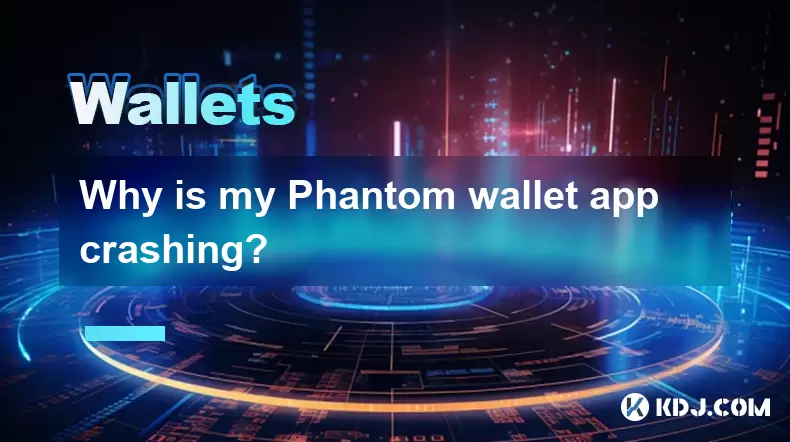
Why is my Phantom wallet app crashing?
Jul 02,2025 at 07:35pm
Understanding Phantom Wallet App CrashesIf you're experiencing issues with the Phantom wallet app crashing, you're not alone. Many users have reported similar problems, especially during high network activity or after recent updates. Phantom is a popular Solana-based wallet that allows users to store, send, and receive SOL tokens as well as interact wit...
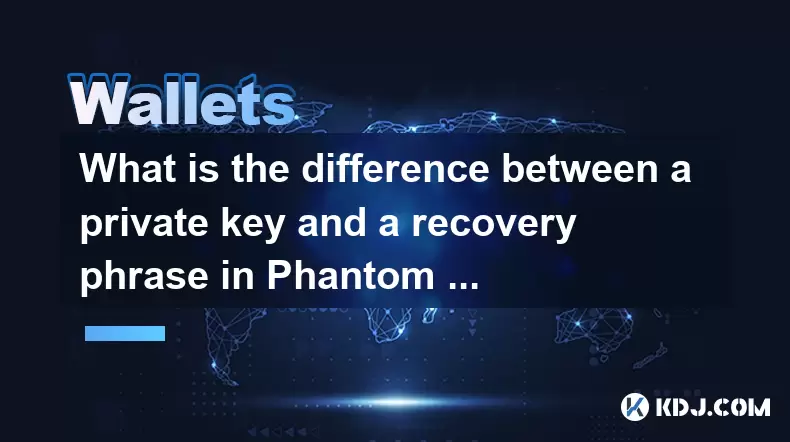
What is the difference between a private key and a recovery phrase in Phantom wallet?
Jul 02,2025 at 09:57am
Understanding the Basics of Phantom WalletPhantom wallet is a non-custodial digital wallet primarily used for interacting with the Solana blockchain. It allows users to store, send, and receive SOL tokens and other digital assets like NFTs. Non-custodial means that the user retains full control over their private keys and recovery phrases. Understanding...
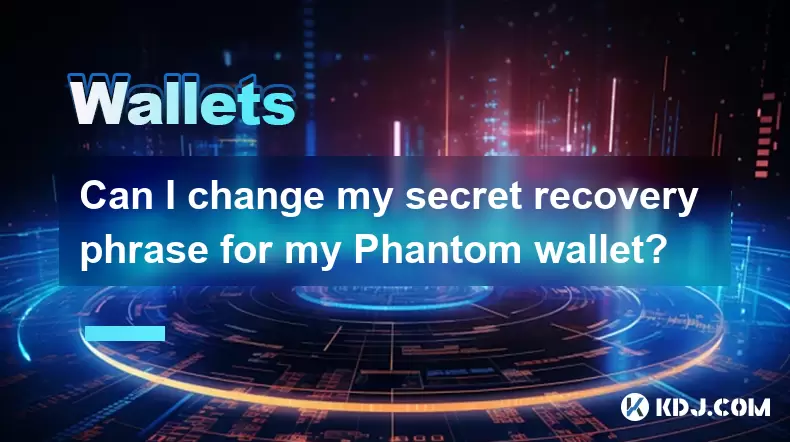
Can I change my secret recovery phrase for my Phantom wallet?
Jul 02,2025 at 12:07pm
Understanding the Role of a Secret Recovery PhraseThe secret recovery phrase, often referred to as a seed phrase, is a critical component in managing cryptocurrency wallets like Phantom. It serves as a backup mechanism that allows users to recover their wallet and associated assets if they lose access to their device or password. Typically, this phrase ...

How to log out of Phantom wallet?
Jul 02,2025 at 05:28pm
What Is Phantom Wallet?Phantom wallet is a popular non-custodial cryptocurrency wallet designed primarily for the Solana blockchain, offering users the ability to store, send, and receive SOL and SPL tokens. It also supports integration with decentralized applications (dApps) and allows users to participate in staking, governance, and NFT trading. Being...
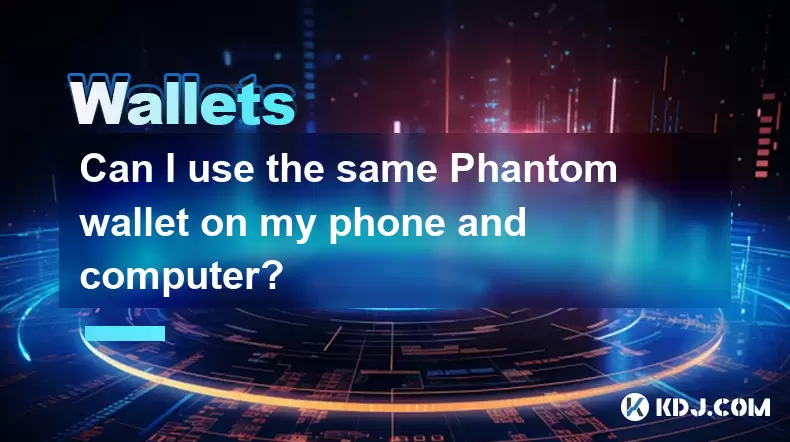
Can I use the same Phantom wallet on my phone and computer?
Jul 02,2025 at 10:04am
Phantom Wallet: Cross-Device CompatibilityPhantom wallet is a non-custodial cryptocurrency wallet designed primarily for interacting with the Solana blockchain. It supports both browser extensions and mobile applications, making it versatile for users who want to manage their digital assets across multiple devices. One of the most common questions among...

What is "rent" on Solana and how does it affect my Phantom wallet?
Jul 02,2025 at 08:35pm
Understanding 'Rent' on SolanaIn the context of Solana, the term 'rent' refers to a storage fee that users pay for maintaining data on the blockchain. Unlike Ethereum, where storage costs are paid once via gas fees during contract deployment, Solana implements a recurring cost model to ensure efficient usage of network resources. This means that any acc...

Why is my Phantom wallet app crashing?
Jul 02,2025 at 07:35pm
Understanding Phantom Wallet App CrashesIf you're experiencing issues with the Phantom wallet app crashing, you're not alone. Many users have reported similar problems, especially during high network activity or after recent updates. Phantom is a popular Solana-based wallet that allows users to store, send, and receive SOL tokens as well as interact wit...

What is the difference between a private key and a recovery phrase in Phantom wallet?
Jul 02,2025 at 09:57am
Understanding the Basics of Phantom WalletPhantom wallet is a non-custodial digital wallet primarily used for interacting with the Solana blockchain. It allows users to store, send, and receive SOL tokens and other digital assets like NFTs. Non-custodial means that the user retains full control over their private keys and recovery phrases. Understanding...

Can I change my secret recovery phrase for my Phantom wallet?
Jul 02,2025 at 12:07pm
Understanding the Role of a Secret Recovery PhraseThe secret recovery phrase, often referred to as a seed phrase, is a critical component in managing cryptocurrency wallets like Phantom. It serves as a backup mechanism that allows users to recover their wallet and associated assets if they lose access to their device or password. Typically, this phrase ...

How to log out of Phantom wallet?
Jul 02,2025 at 05:28pm
What Is Phantom Wallet?Phantom wallet is a popular non-custodial cryptocurrency wallet designed primarily for the Solana blockchain, offering users the ability to store, send, and receive SOL and SPL tokens. It also supports integration with decentralized applications (dApps) and allows users to participate in staking, governance, and NFT trading. Being...

Can I use the same Phantom wallet on my phone and computer?
Jul 02,2025 at 10:04am
Phantom Wallet: Cross-Device CompatibilityPhantom wallet is a non-custodial cryptocurrency wallet designed primarily for interacting with the Solana blockchain. It supports both browser extensions and mobile applications, making it versatile for users who want to manage their digital assets across multiple devices. One of the most common questions among...
See all articles

























































































